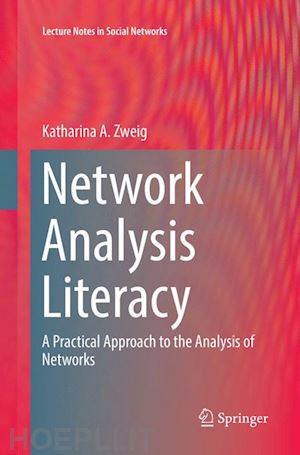
Questo prodotto usufruisce delle SPEDIZIONI GRATIS
selezionando l'opzione Corriere Veloce in fase di ordine.
Pagabile anche con Carta della cultura giovani e del merito, 18App Bonus Cultura e Carta del Docente
This book presents a perspective of network analysis as a tool to find and quantify significant structures in the interaction patterns between different types of entities. Moreover, network analysis provides the basic means to relate these structures to properties of the entities. It has proven itself to be useful for the analysis of biological and social networks, but also for networks describing complex systems in economy, psychology, geography, and various other fields. Today, network analysis packages in the open-source platform R and other open-source software projects enable scientists from all fields to quickly apply network analytic methods to their data sets. Altogether, these applications offer such a wealth of network analytic methods that it can be overwhelming for someone just entering this field. This book provides a road map through this jungle of network analytic methods, offers advice on how to pick the best method for a given network analytic project, and how to avoid common pitfalls. It introduces the methods which are most often used to analyze complex networks, e.g., different global network measures, types of random graph models, centrality indices, and networks motifs. In addition to introducing these methods, the central focus is on network analysis literacy – the competence to decide when to use which of these methods for which type of question. Furthermore, the book intends to increase the reader's competence to read original literature on network analysis by providing a glossary and intensive translation of formal notation and mathematical symbols in everyday speech. Different aspects of network analysis literacy – understanding formal definitions, programming tasks, or the analysis of structural measures and their interpretation – are deepened in various exercises with provided solutions. This text is an excellent, if not the best starting point for all scientists who want to harness the power of network analysis for their field of expertise.











Il sito utilizza cookie ed altri strumenti di tracciamento che raccolgono informazioni dal dispositivo dell’utente. Oltre ai cookie tecnici ed analitici aggregati, strettamente necessari per il funzionamento di questo sito web, previo consenso dell’utente possono essere installati cookie di profilazione e marketing e cookie dei social media. Cliccando su “Accetto tutti i cookie” saranno attivate tutte le categorie di cookie. Per accettare solo deterninate categorie di cookie, cliccare invece su “Impostazioni cookie”. Chiudendo il banner o continuando a navigare saranno installati solo cookie tecnici. Per maggiori dettagli, consultare la Cookie Policy.